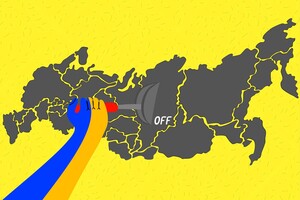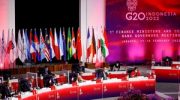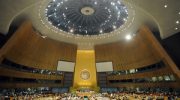Russia may be humiliated by defeat in war, but that does not necessarily make her admire freedom.

Rocket strike by Russian President Vladimir Putin for civilian purposes in Ukraineis both a reprehensible and desperate step in a war he is losing. It is worth trying to answer the question posed by imprisoned oppositionist Oleksii Navalny in a recent essay on our pages: what will happen when it's all over?
The Washington Post writes that how Russia will get out of this disaster. In particular, its course will affect Ukraine's struggle for survival as a democracy, whether Belarus will free itself from a tyrant, whether China and Russia will withstand an alliance of despots, the fate of the world economy dependent on Russian energy exports, and much more. As Navalny noted, even if Ukraine manages to repel the Russian invaders, “where is the guarantee that the world will not find itself against an even more aggressive regime, tormented by resentment and imperial ideas that have little to do with reality?”
There is no guarantee. No one can be sure how the war will end and what its consequences will be. Just think of the amazing turn of events that brought Putin to power. He was hand-picked by the ailing President Boris Yeltsin and his entourage. When Yeltsin announced his resignation at the end of 1999, he entrusted everything to a little-known former KGB officer who had neither experience nor commitment to the democratic aspirations of the previous decade, and who eventually turned it around. Putin has built a very personal dictatorship around his own power and whim.
Also read: Putin has already lost, but what will he do next? Politico on possible scenarios
Looking ahead, Russia has few obvious paths.
One bleak scenario is that Mr. Putin's anti-Western authoritarian kleptocracy, which mixes crony capitalism and despotism, will survive with or without him. A large part of the population of Russia is madly and passionately in love with him. Before the invasion, Mr. Putin's anti-Western rhetoric was “firmly entrenched in the hearts and minds of many Russian citizens,” who are in a “state of deep resentment toward the West” and believe that it was he who prevented Russia from regaining great power status.
Consistency is also reinforced by the powerful security and military structures that Putin has used and expanded over two decades. But the key questions that cannot be answered now are related to the consequences of the defeat in Ukraine: will the military, humiliated and insulted, return against the Kremlin?
Another part of the population of Russia – just as large – simply wanted to be left alone. These citizens put up with Putin's thieving elite and political repression in exchange for some private space in their own lives, some prosperity and the freedom to travel abroad. They have finally been able to object in response to Mr. Putin's recent mobilization order, which has disturbed their calm, but their political aloofness and passivity remain.
Also read: NYT: Putin is catering to Russia's most bloodthirsty, though yes he himself risks
The third cohort, much smaller, is the professional and middle class, educated, experienced, well-travelled and democratic. Many of them at the age of 20-30 have left Russia en masse since the beginning of the war. Those who are older witnessed Mikhail Gorbachev's glasnost and perestroika and saw the 1990s as a brief window of freedom in the long history of Russian autocracy. Thousands of them are stuck in Russian prisons for protests in support of Navalny or against the war and mobilization.
In his essay, Navalny correctly notes that the super-presidential system was created for Yeltsin in the Russian Constitution of 1993. “Giving a lot of power to a good guy seemed logical at the time,” he wrote. Putin inherited Yeltsin's powers, but not his commitment to constitutional guarantees of freedom.
In a report last year for the Atlantic Council, Anders Aslund, an economist and expert on Russia, Ukraine and Eastern Europe, and Leonid Gozman, a politician and commentator long involved in Russia's democracy movements, outlined what it might take to build democracy in Russia. They advocate a parliamentary system and a new democratic constitution, restoration of full freedom of speech, assembly, and belief; release of political prisoners; cutting out the “cancerous tumor” of oligarchs who milked the state for their own enrichment; establishing the true rule of law; dissolution of existing security services and their creation anew; restoration of a functioning parliament; free elections and decentralization of power in regions and cities.
Read also: Is Putin removed from power?
After the collapse of the USSR in 1991, real attempts were made to build a market democracy and emulate the West. For the first time in its history, Russia imitated not only Western culture or technology, but also the Western political system.
Yeltsin created a distorted oligarchic capitalism and failed to establish the rule of law. It was a disorienting time for many Russians. Russian journalist and political scientist Maria Lipman wrote: “Suddenly, imitation of the West failed to provide Western standards of living. The first post-Soviet decade brought political upheaval, the collapse of the usual security system, deep insecurity and deep disillusionment.
Putin took advantage of this disillusionment, deriding the entire 1990s as chaos, and in the following years took advantage of the growing wave of prosperity that increased oil exports. He moved away from the oligarchs of Yeltsin's time and subordinated them to his will, while enriching his own relatives. Gradually, he nurtured the tender sprouts of democracy. Now they are completely gone.
Read also: Putin makes strategic mistakes because of unlimited power – Jeremy Fleming
The United States and Europe must prepare for what comes next in Russia. There will be no pressure for Western values. American tools of the post-Soviet period will not necessarily come in handy. It is necessary to start thinking now about how to reach a society that has hardened and hardened over the past two decades.
Related video
Keeping channels open to the Russian people will be vital, whoever comes to power. Ideally, after the war and after Putin, Navalny will be free and become a leading voice in establishing Russia in a democratic system. This result deserves our hope. But it would also be reasonable to expect Russia to follow other paths, perhaps led by another strongman. A country may be humiliated by losing a war, but that does not necessarily make it admire freedom.
See special topic: The authorities of the Russian Federation instructed to repair the Crimean Bridge no later than July 2023 RosZMI published the relevant order of the Government of the Russian Federation. Collaborator Balytsky received a passport of the Russian Federation even before the occupation – mass media Local mass media assure that he was preparing in advance for the Russian invasion. Martial law: the government approved the mechanism for the departure of aviation workers abroad Corresponding changes have already been introduced into the law. As a result of yesterday's rocket attack on Mykolaiv, seven people were killed – the head of the OVA Emergency and rescue operations continue. Probability of using nuclear weapons against Ukraine increased tenfold – ex-head of the Pentagon A well-planned Ukrainian offensive forces Russian troops to retreat, and Putin, who is under siege, tries to mobilize new recruits against the backdrop of growing dissent in Russia.


